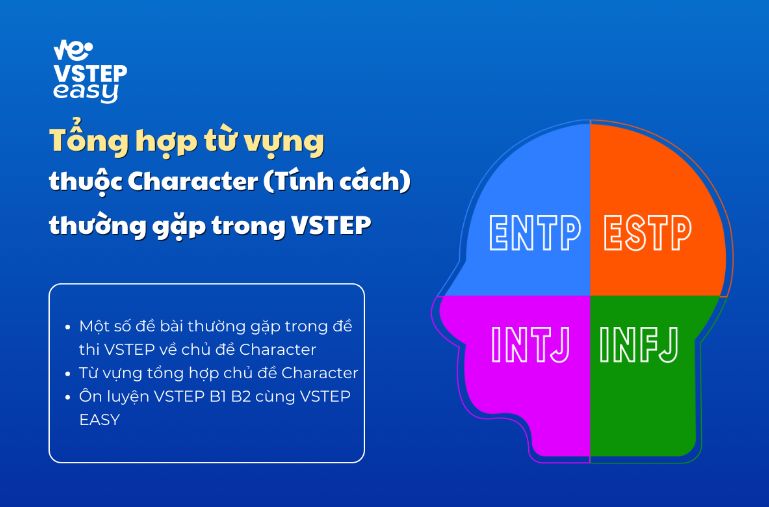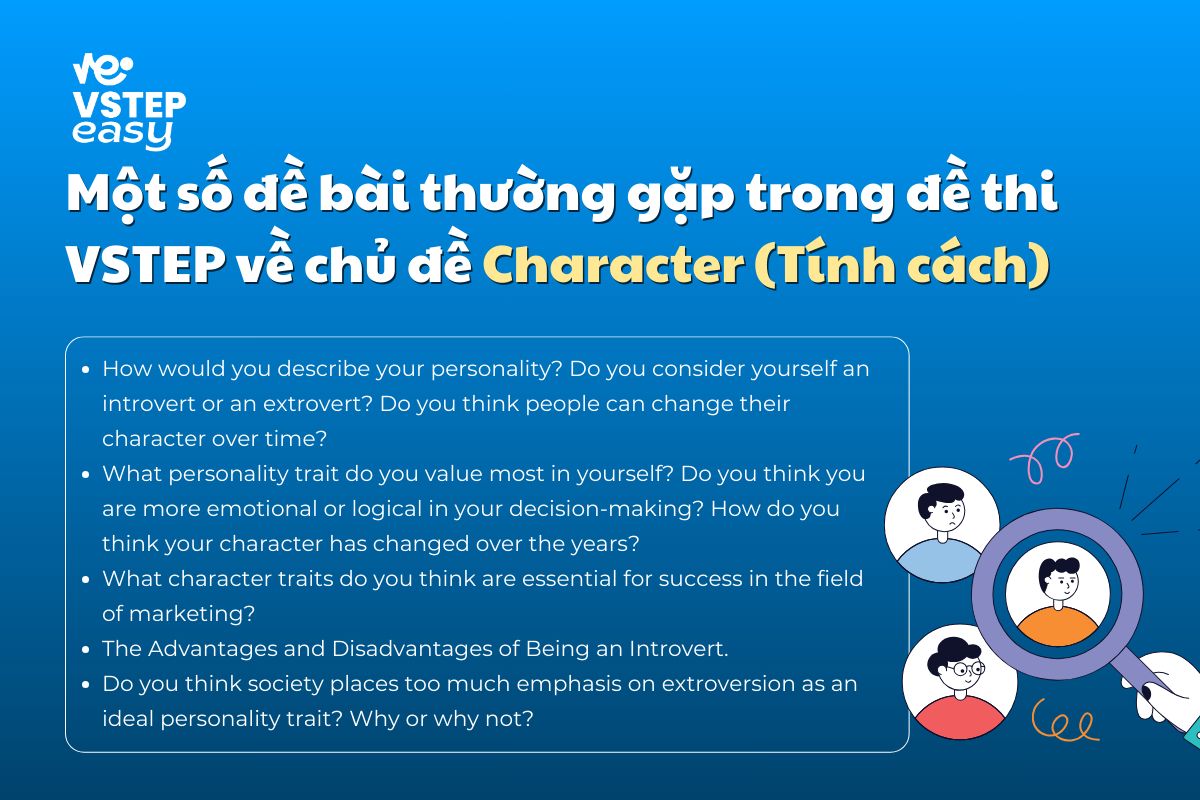Tổng hợp từ vựng thuộc Character (Tính cách)
Bộ từ vựng về chủ đề Character (Tính cách) và các bài mẫu liên quan giúp bạn tự tin ghi điểm trong Speaking và Writing VSTEP được trình bày trong bài viết này.

VSTEP EASY
Tổng hợp từ vựng thuộc Character (Tính cách)
Bộ từ vựng về chủ đề Character (Tính cách) và các bài mẫu liên quan giúp bạn tự tin ghi điểm trong Speaking và Writing VSTEP được trình bày trong bài viết này.

VSTEP EASY
Trong bài thi VSTEP, chủ đề Character (Tính cách) thường xuất hiện, yêu cầu thí sinh không chỉ nắm chắc từ vựng mà còn phải biết cách áp dụng vào các dạng đề bài khác nhau. Bài viết này sẽ cung cấp một danh sách các từ vựng phổ biến liên quan đến chủ đề "Character" cùng với những đề bài thường gặp và bài mẫu đi kèm. Hãy cùng VSTEP EASY khám phá ngay chủ đề quen thuộc này nhé!
 Một số đề bài thường gặp trong đề thi VSTEP về chủ đề Character
Một số đề bài thường gặp trong đề thi VSTEP về chủ đề Character
-
Speaking Part 1: How would you describe your personality? Do you consider yourself an introvert or an extrovert? Do you think people can change their character over time? (Bạn miêu tả tính cách bạn như thế nào? Bạn nghĩ mình thuộc kiểu người hướng nội hay hướng ngoại? Bạn có nghĩ mọi người có thể thay đổi tính cách theo thời gian?)
-
Speaking Part 1: What personality trait do you value most in yourself? Do you think you are more emotional or logical in your decision-making? How do you think your character has changed over the years? (Tính cách nào của bạn mà bạn đánh giá cao nhất? Bạn nghĩ bạn là người ra quyết định dựa trên cảm xúc hay lý trí? Bạn nghĩ tính cách của bạn đã thay đổi theo thời gian như thế nào?)
-
Speaking Part 3: What character traits do you think are essential for success in the field of marketing? (Bạn nghĩ những tính cách nào quan trọng đối với sự thành công của một người trong lĩnh vực marketing?)
-
Writing Part 2: What are the advantages and disadvantages of being an Introvert. (Ưu và nhược điểm của người hướng nội là gì?)
-
Writing Part 2: Do you think society places too much emphasis on extroversion as an ideal personality trait? Why or why not? (Bạn có nghĩ xã hội coi sự hướng ngoại là một kiểu tính cách lý tưởng không? Tại sao và tại sao không?)
Xem thêm: Tổng hợp từ vựng thuộc 15 chủ đề thường gặp cần ôn tập trong bài thi VSTEP
Từ vựng tổng hợp chủ đề Character

Một số đề bài thường gặp trong VSTEP về chủ đề Character (Tính cách)
Bảng tổng hợp từ vựng thông dụng về chủ đề Character
|
Từ vựng |
Phiên âm |
Nghĩa tiếng Việt |
Ví dụ |
|
Personality (n) |
/ˌpɜːrsəˈnæləti/ |
Tính cách |
She has a very outgoing personality. (Cô ấy có một tính cách rất cởi mở.) |
|
Introversion (n) |
/ˌɪntrəˈvɜːrʒn/ |
Tính hướng nội |
He's a bit of an introvert and prefers quiet evenings at home. (Anh ấy hơi hướng nội và thích những buổi tối yên tĩnh ở nhà.) |
|
Extroversion (n) |
/ˌekstrəˈvɜːrʒn/ |
Tính hướng ngoại |
My sister is a real extrovert; she loves parties and meeting new people. (Chị gái tôi là một người hướng ngoại thực sự; cô ấy yêu thích các bữa tiệc và gặp gỡ những người mới.) |
|
Ambivert (n) |
/ˈæmbɪvɜːt/ |
Người có cả tính hướng nội và hướng ngoại |
Many people are ambiverts, showing both introverted and extroverted traits. (Nhiều người là người hướng nội và hướng ngoại, thể hiện cả những nét tính cách hướng nội và hướng ngoại.) |
|
Solitude (n) |
/ˈsɒlətjuːd/ |
Sự cô đơn |
She enjoys spending time in solitude, reading, and reflecting. (Cô ấy thích dành thời gian một mình, đọc sách và suy ngẫm.) |
|
Reflection (n) |
/rɪˈflekʃn/ |
Sự suy ngẫm |
After a long day, I like to sit and have some quiet reflection. (Sau một ngày dài, tôi thích ngồi và suy ngẫm một chút.) |
|
Characteristic (n) |
/ˌkærəktəˈrɪstɪks/ |
Đặc điểm |
One of her most striking characteristics is her sense of humor. (Một trong những đặc điểm nổi bật nhất của cô ấy là khiếu hài hước.) |
|
Adapt (v) |
/əˈdæpt/ |
Thích nghi |
She's very adaptable and can easily adjust to new situations. (Cô ấy rất dễ thích nghi và có thể dễ dàng điều chỉnh với những tình huống mới.) |
|
Harmonious (adj) |
/hɑːˈməʊniəs/ |
Hài hòa |
They have a very harmonious relationship. (Họ có một mối quan hệ rất hòa hợp.) |
|
Experience (n) |
/ɪkˈspɪəriənsɪz/ |
Trải nghiệm |
Life experiences shape who we are. (Những trải nghiệm cuộc sống định hình con người chúng ta.) |
|
Self-awareness (n) |
/ˌself əˈwɛːnəs/ |
Tự nhận thức |
Self-awareness is the key to personal growth. (Tự nhận thức là chìa khóa để phát triển bản thân.) |
|
Shy (adj) |
/ʃaɪ/ |
Nhút nhát |
She's a shy person and doesn't like being the center of attention. (Cô ấy là một người nhút nhát và không thích trở thành trung tâm của sự chú ý.) |
|
Reserved (adj) |
/rɪˈzɜːvd/ |
Kín đáo |
He's a very reserved person and doesn't share his feelings easily. (Anh ấy là một người rất kín đáo và không dễ dàng chia sẻ cảm xúc của mình.) |
|
Confidence (n) |
/ˈkɒnfɪdəns/ |
Sự tự tin |
Having confidence in yourself is important. (Tự tin vào bản thân là điều quan trọng.) |
|
Outgoing (adj) |
/ˌaʊtˈɡəʊɪŋ/ |
Cởi mở |
She's a very outgoing person and loves to meet new people. (Cô ấy là một người rất cởi mở và thích gặp gỡ những người mới.) |
|
Resilience (n) |
/rɪˈzɪliəns/ |
Sự kiên cường |
She showed great resilience in overcoming her illness. (Cô ấy đã thể hiện sự kiên cường tuyệt vời khi vượt qua căn bệnh của mình.) |
|
Overcome (v) |
/ˌəʊvəˈkʌm/ |
Vượt qua |
He managed to overcome his fear of flying. (Anh ấy đã vượt qua được nỗi sợ bay của mình.) |
|
Determination (n) |
/dɪˌtɜːmɪˈneɪʃn/ |
Sự quyết tâm |
With determination, you can achieve anything. (Với sự quyết tâm, bạn có thể đạt được bất cứ điều gì.) |
Bài mẫu thuộc chủ đề Character
|
Speaking Part 1: How would you describe your personality? Do you consider yourself an introvert or an extrovert? Do you think people can change their character over time? |
|
I would describe my personality as balanced between introversion and extroversion, often referred to as ambivert. I enjoy social gatherings and connecting with others, but I also value my solitude and personal reflection time. This blend of characteristics allows me to adapt to various social situations and maintain a harmonious life. In my opinion, people can definitely change their character over time. Experiences, environments, and self-awareness play crucial roles in shaping who we are. For example, someone who was once shy and reserved might develop confidence and become more outgoing as they grow older. Ultimately, our personalities are not fixed; they evolve as we learn and experience new things in life. |
|
Personality (n): Tính cách Introversion (n): Tính hướng nội Extroversion (n): Tính hướng ngoại Ambivert (adj): Người có cả tính hướng nội và hướng ngoại Solitude (n): Sự cô đơn Reflection (n): Sự suy ngẫm Characteristics (n): Đặc điểm Adapt (v): Thích nghi Harmonious (adj): Hài hòa Experiences (n): Trải nghiệm Self-awareness (n): Tự nhận thức Shy (adj.): Nhút nhát Reserved (adj): Kín đáo Confidence (n): Sự tự tin Outgoing (adj): Cởi mở |
|
Speaking Part 1: What personality trait do you value most in yourself? Do you think you are more emotional or logical in your decision-making? How do you think your character has changed over the years? |
|
The personality trait I value most in myself is resilience. This trait has helped me overcome many challenges in life and bounce back from setbacks with determination and a positive outlook. When it comes to decision-making, I believe I lean more towards being logical, as I prefer to analyze situations carefully and consider all available information before making a choice. However, I also acknowledge the importance of emotions and often take into account how my decisions might affect others emotionally. Over the years, I think my character has evolved significantly. I have become more open-minded and adaptable, learning to embrace change and view different perspectives with empathy. My past experiences have taught me to be more self-aware and to understand the value of both emotional intelligence and logical reasoning. This growth has allowed me to become a more balanced individual, capable of navigating life's complexities with greater ease and understanding. |
|
Resilience (n): Sự kiên cường Overcome (v): Vượt qua Determination (n): Sự quyết tâm Logical (adj): Lý trí Open-minded (adj): Cởi mở Adaptable (adj): Khả năng thích nghi Self-aware (adj): Tự nhận thức Emotional intelligence (n): Trí tuệ cảm xúc Logical reasoning (n): Lý luận logic |
|
Speaking Part 3: What character traits do you think are essential for success in the field of marketing? |
|
In the field of marketing, certain character traits are essential for achieving success. Firstly, creativity is crucial, as it enables marketers to develop innovative strategies that capture the audience's attention and differentiate their brand from competitors. Adaptability is another key trait, allowing marketers to adjust their strategies based on ever-changing market trends and consumer behaviors. Additionally, strong communication skills are vital for effectively conveying ideas and collaborating with clients and team members. Resilience is important as well, as marketers often face challenges and setbacks that require perseverance and a positive attitude to overcome. Lastly, analytical thinking is necessary to interpret data, understand market dynamics, and make informed decisions. These traits, combined with a passion for continuous learning, contribute to a marketer's success in a dynamic and competitive industry. |
|
Creativity (n): Sự sáng tạo Adaptability (n): Khả năng thích nghi Communication skills (n): Kỹ năng giao tiếp Resilience (n): Sự kiên cường Perseverance (n): Sự bền bỉ Analytical thinking (n): Tư duy phân tích Positive attitude (n): Thái độ tích cực Continuous learning (n): Học tập liên tục |
Xem thêm: Tổng hợp từ vựng thuộc Work and Job (Nghề nghiệp)
|
Writing Part 2: What are the advantages and disadvantages of being an Introvert? |
|
Being an introvert comes with its own set of advantages and disadvantages that can impact various aspects of life. One of the key advantages of being an introvert is the ability to engage in deep thinking and self-reflection. Introverts often excel at problem-solving and decision-making because they take the time to think things through carefully. This thoughtful nature often translates into strong creativity and the capacity for independent work, allowing introverts to come up with unique solutions and ideas. Additionally, introverts tend to be great listeners, making them excellent friends and colleagues who can offer thoughtful advice and support. However, being an introvert also comes with its disadvantages. In social situations, introverts might find themselves feeling drained or overwhelmed, especially in large gatherings or environments that require constant interaction. This can lead to challenges in networking or pursuing leadership roles that often favor more extroverted traits. Furthermore, introverts may sometimes be perceived as aloof or distant, which can hinder the development of new relationships. Balancing the need for solitude with the demands of social interaction can be challenging for introverts, but by understanding and embracing their unique strengths, they can navigate these challenges effectively. |
|
Deep thinking (n): Suy nghĩ sâu sắc Self-reflection (n): Tự suy ngẫm Problem-solving (n): Giải quyết vấn đề Decision-making (n): Ra quyết định Creativity (n): Sự sáng tạo Independent work (n): Làm việc độc lập Unique solutions (n): Giải pháp độc đáo Great listeners (n): Người biết lắng nghe Drained (adj): Kiệt sức Aloof (adj): Lạnh lùng, tách biệt Distant (adj): Xa cách Solitude (n): Sự cô đơn |
|
Writing Part 2: Do you think society places too much emphasis on extroversion as an ideal personality trait? Why or why not? |
|
I believe society often places too much emphasis on extroversion as an ideal personality trait, which can be limiting and even detrimental. In many cultures, extroverted qualities such as being outgoing, sociable, and assertive are often celebrated and seen as signs of confidence and leadership. This can create an unfair bias against introverts, who may possess equally valuable qualities like deep thinking, empathy, and the ability to listen carefully. In educational and professional settings, extroverts are often favored, with group activities and networking events catering more to their strengths. This societal bias can lead introverts to feel undervalued and pressured to change their natural dispositions. It’s important to recognize that both introverted and extroverted traits have their own unique strengths, and a balanced approach that values diversity in personality types can lead to more inclusive and innovative environments. By embracing a variety of character traits, society can appreciate the full spectrum of human potential, allowing individuals to thrive in their own unique ways. |
|
Ideal (adj): Lý tưởng Sociable (adj): Thân thiện Assertive (adj): Quyết đoán Leadership (n): Khả năng lãnh đạo Bias (n): Sự thiên vị Deep thinking (n): Suy nghĩ sâu sắc Empathy (n): Sự thấu cảm Undervalued (adj): Không được đánh giá cao Dispositions (n): Tính cách tự nhiên Innovative (adj): Đổi mới Human potential (n): Tiềm năng con người |
Ôn luyện VSTEP B1 B2 cùng VSTEP EASY
Việc tự học để thi VSTEP có thể là một thách thức lớn đối với nhiều thí sinh. Nếu bạn đang tìm kiếm một địa điểm uy tín và chất lượng để chuẩn bị cho kỳ thi này, VSTEP EASY là một lựa chọn đáng cân nhắc. Với VSTEP EASY, chất lượng và trải nghiệm học tập của học viên luôn là ưu tiên hàng đầu trong quá trình phát triển!
-
Lộ trình học 40 giờ: VSTEP EASY cung cấp một lộ trình học tập tinh gọn, kéo dài chỉ từ 5 đến 9 tuần. Giáo trình được biên soạn kỹ lưỡng, tập trung vào những kiến thức cốt lõi nhất. Chỉ học những gì cần thiết, tránh những nội dung dài dòng không cần thiết, giúp tiết kiệm thời gian cho học viên.
-
Cấu trúc lấy điểm chi tiết từng kỹ năng: VSTEP EASY không chỉ hướng dẫn cách làm bài một cách có hệ thống mà còn cung cấp bài tập và hướng dẫn chi tiết về cách tối ưu hóa điểm số cho từng kỹ năng. Việc hiểu rõ tiêu chí đánh giá giúp bạn cải thiện hiệu quả ôn tập và tăng cường sự tự tin khi bước vào kỳ thi.
-
Chữa bài Nói Viết 1:1: Đội ngũ giảng viên giàu kinh nghiệm của VSTEP EASY sẽ hỗ trợ chữa bài Nói và Viết 1:1 qua video miễn phí hàng tuần. Bạn sẽ nhận được phản hồi chi tiết và hướng dẫn cụ thể để cải thiện kỹ năng, từ đó phát huy điểm mạnh và khắc phục điểm yếu một cách hiệu quả nhất.
-
30 bộ đề thi chuẩn cấu trúc: VSTEP EASY cung cấp 30 bộ đề thi chuẩn cấu trúc và được cập nhật liên tục, giúp bạn làm quen với dạng câu hỏi và định dạng của đề thi thực tế. Bài tập về nhà sẽ hỗ trợ bạn luyện tập thường xuyên và củng cố kiến thức một cách hiệu quả.
VSTEP EASY đã giúp hơn 10.000 thí sinh trên khắp cả nước đạt chứng chỉ VSTEP B1, B2 chỉ trong 40h học nên VSTEP EASY tự hào khi tích lũy được một nguồn tài liệu đa dạng và chất lượng, chuẩn cấu trúc đề thi thật. VSTEP EASY tự tin là một đối tác đồng hành trên hành trình chinh phục chứng chỉ VSTEP B1, B2 của bạn!
Trên đây là bài viết Tổng hợp từ vựng thuộc Character (Tính cách) thường gặp trong đề thi VSTEP. Hy vọng bài viết này sẽ cung cấp cho bạn phần nào vốn từ vựng về chủ đề “Sở thích” cũng như một số dạng đề thường gặp trong VSTEP. Đừng quên ôn tập từ vựng thường xuyên để củng cố vốn từ của mình và nâng cao sự tự tin trong các tình huống giao tiếp thực tế. Chúc các bạn học tập hiệu quả và thành công trong kỳ thi sắp tới!
Nhanh tay đăng ký sớm khóa học VSTEP EASY để không bỏ lỡ cơ hội ưu đãi đặc biệt!
Lộ trình cấp tốc B1 - B2 VSTEP trong 40h (5-9 tuần) tại VSTEP EASY
Thông tin liên hệ VSTEP EASY:
-
Hotline: (Ms. Ngọc): 0867388625
-
Fanpage: VSTEP dễ hiểu cùng Jess
-
Group: Luyện thi B1 B2 VSTEP không hề khó cùng Ms. Jess và VSTEP EASY
-
Youtube: VSTEP EASY - 6 Tuần Chinh Phục Chứng Chỉ B1 B2 VSTEP
-
Youtube: VSTEP dễ hiểu cùng Jess
-
TikTok: VSTEP dễ hiểu cùng Jess